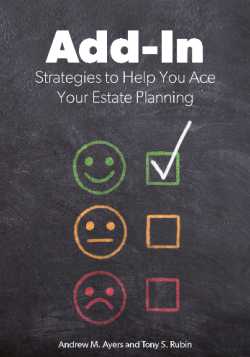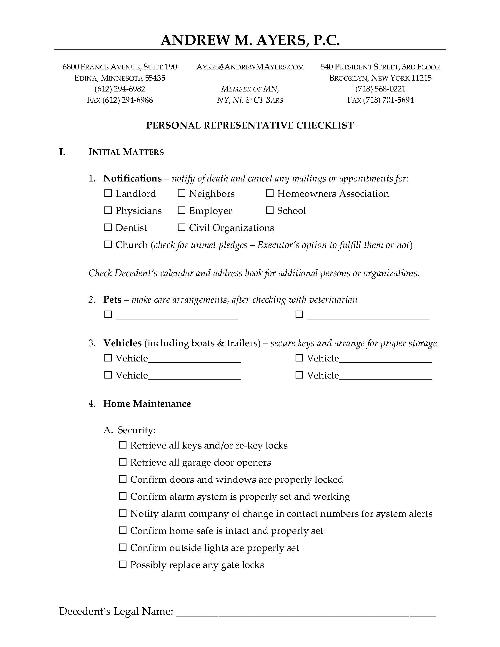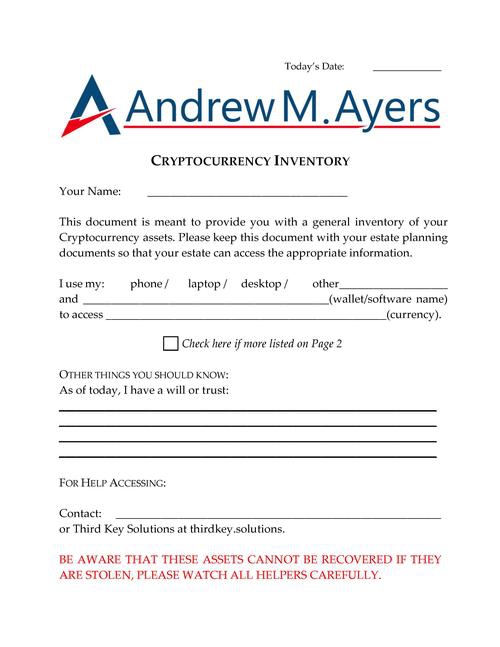 Your Last Will and Testament (you'll normally hear it just called your "Will") is the central document to your estate plan. Depending on the complexity of your estate, there can be many other documents that you create to leave a lasting legacy to your family or charities. You may use another document, a trust, to do some advanced planning to meet your goals and you'll want to make sure you have the appropriate powers of attorney as well. But at a foundational level, your Will is the starting point for most of your estate planning.
Your Last Will and Testament (you'll normally hear it just called your "Will") is the central document to your estate plan. Depending on the complexity of your estate, there can be many other documents that you create to leave a lasting legacy to your family or charities. You may use another document, a trust, to do some advanced planning to meet your goals and you'll want to make sure you have the appropriate powers of attorney as well. But at a foundational level, your Will is the starting point for most of your estate planning.
Do I Need a Will?
This is often the first question I get and the answer is that you probably do need a will, but choosing not to have one is also a form of estate planning as well. If you don't have a will, your family will be left with a variety of tasks to sort out:
- They will need to go to Court to sort out your affairs;
- They may need court approval to sell any of your assets;
- The Court will appoint a personal representative for the estate - and it may not be the person that you would've chosen;
- The Court will have to sort out guardianship for your children if they are under 18;
- Your family members who you don't particularly care for may end up inheriting a lot of your estate simply because they are related to you; and
- The local laws may not have the provisions needed to protect a family member of yours with special needs.
If this seems like a lot, it is and it can be an expensive and daunting process for your family. But it's easily avoidable with an estate plan. Using that estate plan, instead of all of the above, your personal representative takes your original will and death certificate to the Court and if your documents are in order, they just need to distribute the assets and report back to the Court in 6 months or so.
Do I Want to Avoid Probate Court?
Avoiding your local probate court is probably the first bit of advice you've heard on a podcast or read in an article. These are usually designed to sell you on the need for a trust, which is one way to avoid probate court. Not everyone needs a trust, but your attorney loves them because they get paid more money to create a trust than a simple will-based estate plan. One of the primary advantages is that a trust will keep everything private, probate filings are technically public records. If you are considering a trust, it's important to speak to a professional to determine if a trust is what you truly need.
You should also know that in many states, the probate court is going to be involved in some form. When someone dies with a will, the death certificate and the will need to be filed with the Court. One of the most important reasons is that it begins the clock for creditors to make claims against the estate. If you don't ever make that filing, you can be extending the time that creditors have to get paid. But if everything you own is already in your trust, you may not need to open an estate at all since you don't technically own anything at the time of your death.
Probate v. Non-Probate Assets
One term that you'll hear quite a bit about is whether an asset is a "probate" asset or not. A probate asset is an asset that is distributed under your will. These are usually assets that are solely in your name at the time of your death and that don't have a beneficiary designation on them. If the asset has a beneficiary designation, that asset is distributed "outside" of your will and is considered a "non-probate" asset. With these types of assets, the title automatically transfers to the beneficiary when you die.
What's in Your Will?
We've talked about reasons for a Will and the types of assets you deal with, but you should also have an idea of what's actually in your will. This list is not a list of everything and your will may not actually contain all of these provisions depending on the goals of your estate plan:
- Personal Representative/Executor - the person who administers your estate
- Specific Distributions - directions of specific amounts or items to go to specific people or charities
- Personal Property Memorandum - in some states, it's a short document where you can list personal property and who it should be given to
- Division of your estate - it doesn't have to be equal, you can play favorites if you want
- Remote Contingent Beneficiaries - who inherits if everyone you intended to inherit are already deceased
- Charitable donations
- Cryptocurrency and Digital Assets - if you have these, make sure you have the right provisions in your will
- Testamentary trusts - a special type of trust that is set up in your will, normally for children who are under 18 to appoint guardians and trustees for them
- Pets - you can create a pet trust if you'd like
- Burial/Cremation Instructions
Signing Your Will
Once your will is ready, it's time to sign the documents and you need to make sure you are obeying the formalities that are required by your state. You'll want to check with your lawyer to make sure you're doing it right, but generally, your will needs two witnesses and a notary public. After you've signed it, do not put it in your safe deposit box - keep it with your important papers in your house or somewhere else that is accessible. I also recommend you keep a list of the important advisors who you work with (you can download the version my clients use for free, it's called the My Personal Planning Essentials checklist) and that you work with an attorney who provides an online portal to help you access your documents. Finally, it's a good idea to talk with your family about your estate plan, while you don't need to tell them every detail, it's a good idea that they have a general notion of what your plan says.
How Often Should You Update Your Will?
Once you've done all your planning and signed your documents, you are done with that phase of your estate plan, but there's always more to be done. You should have your estate plan documents fully reviewed every 3 years to see if any changes need to be made (it's easy to update your will). Especially if you've been through a major life event like a divorce, new children or grandchildren being born or a death in the family, it's a good idea to make sure your documents are updated.
Next Steps
You've got a lot of different things to think about after reading through all of this. The best next step would be to hop on a Legal Strategy Session and we can discuss the best options for you and your family, whether that's an update on your current estate plan or creating a brand new one.




